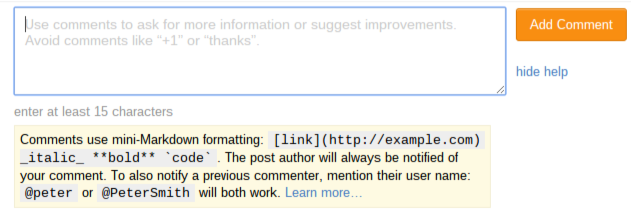Got around to talking about comment flags with Robert Cartaino this morning... We're working on rejiggering the flagging options to make it a bit more obvious when stuff should be flagged, with the end goal of making it possible to automate some of the current flag-handling. More on that later; one of the things that came up in this discussion was the perpetual confusion among new (and some old) users about what comments can actually be used for.
And it occurred to both of us that perhaps the name itself is misleading here.

Comments are those things you find below blog posts and YouTube videos, where passers-by dump the contents of their minds. They can be useful, augmenting the article or video... But all too often, they're just a venue for sophomoric rants and trolling. Jeff argued that the real solution here is to make comments better by moderating them, but sadly this remains the exception rather than the rule...
Except here. We do moderate comments, ruthlessly! Which frequently leads to a fair bit of culture-shock from folks who are used to the meaning of "comment" everywhere else on The Internet.
So yeah. Before we make this even worse by beefing up our moderation systems, perhaps we should find a less misleading term for what we're letting folks do? One that isn't a synonym for unhelpful and unwanted chatter.
As usual, I don't have any clever ideas here... So I propose we do the obvious thing and describe what we actually want: critiques and requests for clarification for the post being commented on.

To be clear: I'm only proposing changing the terminology as it appears below posts, where the link is actually an action rather than just a name. Comments can remain as "comments" everywhere else.
Thoughts? Critiques? Post 'em as answers for the irony.


